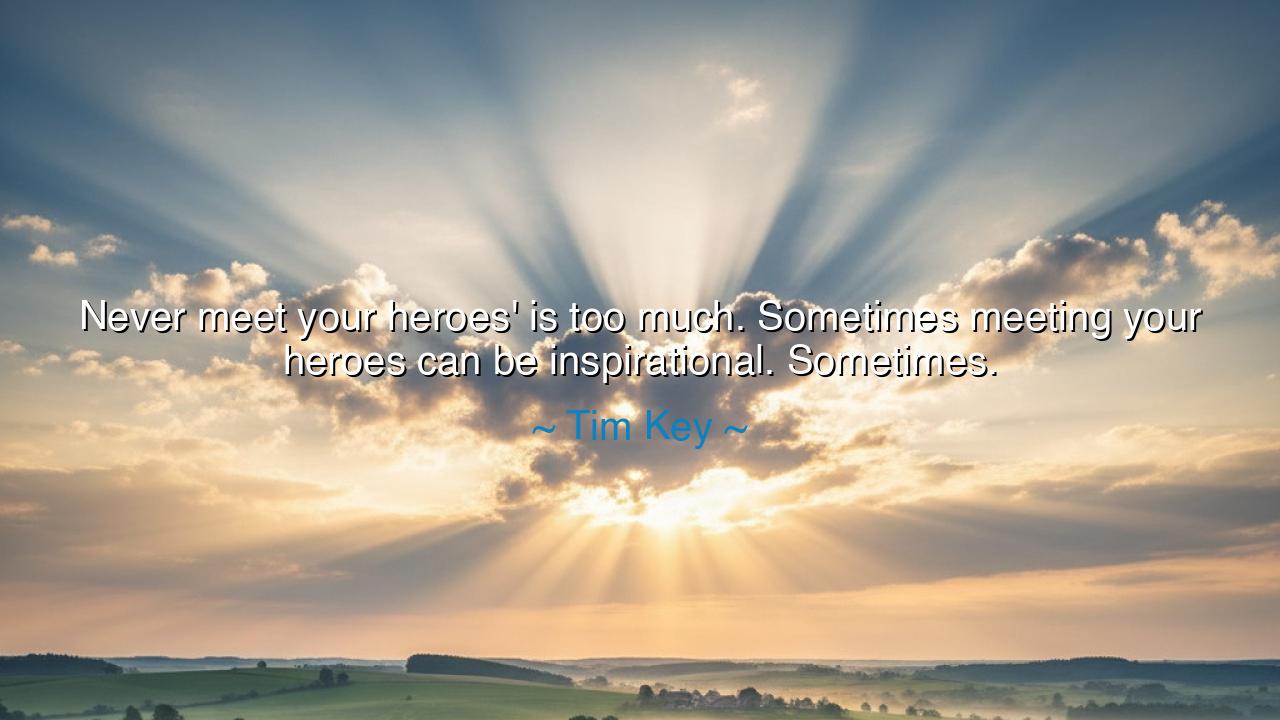
Never meet your heroes' is too much. Sometimes meeting your
Never meet your heroes' is too much. Sometimes meeting your heroes can be inspirational. Sometimes.






In the vast expanse of human existence, where the tides of ambition, admiration, and longing meet, there lies a powerful truth—heroes, though elevated in our hearts and minds, are not beyond the reach of flaws and imperfections. Tim Key, with his wry and thoughtful words, has captured this truth perfectly when he says, "Never meet your heroes' is too much. Sometimes meeting your heroes can be inspirational. Sometimes." This statement echoes an ancient wisdom, one that has traveled through time, reminding us that heroes, while deserving of our respect and admiration, are still human, subject to the same imperfections and disappointments that we ourselves experience.
For ages, humankind has been captivated by the notion of heroes. From the legendary exploits of Hercules to the brave feats of Joan of Arc, we have elevated certain figures to the status of the divine, believing that they embody the best of what it means to be human. These individuals, through their acts of courage, strength, and wisdom, become symbols of hope, inspiring generations to come. Yet, as Tim Key wisely suggests, meeting these heroes in the flesh can sometimes lead to disillusionment. The pedestal upon which we have placed them may crumble when we come face to face with their humanity, their flaws, and their imperfections. And yet, therein lies the deeper lesson—heroes are not perfect gods, but human beings who, through their struggles and imperfections, show us the way forward.
Consider the story of the great poet Homer, whose epic works, the Iliad and the Odyssey, have been revered for centuries. He, too, was once an idealized figure—his poetry elevating him to the status of a near-divine genius. Yet, there is no true record of Homer himself, no clear image of his life or his personal struggles. He remains an enigma, his works all we have of him. And so, in this way, Homer becomes a hero in absentia, inspiring millions through his writings, but his true self—the man behind the myth—remains unknown. Had we met Homer, perhaps we would have found him less than the towering figure we imagined, and perhaps that would have changed the way we read his works. Yet, his influence endures precisely because we know him as the hero of the poems, not as the flawed man behind them.
And yet, meeting a hero can also bring unexpected light. Just as Tim Key suggests, sometimes the very encounter with our heroes can provide inspiration, for in their imperfections, we may find reflections of our own struggles and triumphs. Consider the example of the great artist Michelangelo. He was known to have been a difficult and demanding figure, his temper as fiery as his genius. But those who worked closely with him, such as his assistants, often spoke of the deep inspiration they found in his presence. Michelangelo’s pursuit of perfection, despite his personal flaws, became a lesson for many. The very human challenges he faced, his relentless drive for greatness, and his perfectionism inspired generations of artists to push their own limits. To meet such a hero, with all his struggles, was to see the path to greatness more clearly, despite (or perhaps because of) his imperfections.
The truth of meeting your heroes, then, lies in the realization that they are not gods, but humans like you. They have their moments of greatness, yes, but also their moments of weakness. In this, they become not the unreachable figures we sometimes make them out to be, but examples of what it means to be human—capable of both extraordinary achievements and deeply human flaws. To meet a hero is to see not just their brilliance, but their struggles, and in doing so, we understand that we, too, can strive for greatness despite our own imperfections. The lesson here is profound: heroes are not infallible beings—they are mirrors of our own potential, showing us that greatness can come from anyone, as long as we embrace both our strengths and our weaknesses.
So, to the generations that follow, take this wisdom to heart: heroes are not perfect figures beyond your reach, but fellow travelers on the road of life. Look to them not as gods, but as mirrors of your own potential. Let their triumphs inspire you, yes, but let their flaws teach you as well. Embrace the lessons they offer, not only in their greatness, but in their very humanness. In meeting your heroes—whether in person or through the pages of history—remember that you too can walk the path of greatness. You do not need to be perfect, you need only to be persistent, human, and courageous in your pursuit of your own journey.
In this way, meeting your heroes can indeed be inspirational—not because they are flawless, but because they are real. And through their realness, we find the strength to rise, to fall, and to rise again. The lesson of the hero is not to imitate their perfection, but to learn from their imperfection and to see in their humanity the spark of your own potential.






AAdministratorAdministrator
Welcome, honored guests. Please leave a comment, we will respond soon